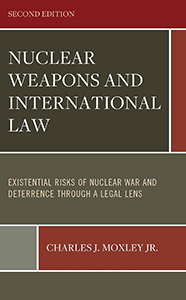Interview with Charles Moxley Jr


Charles Moxley Jr.
author of "Nuclear Weapons and International Law: Existential Risks of Nuclear War and Deterrence through a Legal Lens"

Michael Carter
Co-Host
Charles Moxley Jr., author of "Nuclear Weapons and International Law: Existential Risks of Nuclear War and Deterrence through a Legal Lens"
Charles Moxley Jr.'s Website
Charles J. Moxley, Jr. teaches nuclear weapons law at Fordham Law School and has written about international law restraints on the threat and use of nuclear weapons for over twenty years, starting with his 2000 book, Nuclear Weapons and International Law in the Post Cold War World, of which this book is the second edition.
Moxley is the co-author of the 2011 article, Nuclear Weapons and Compliance with International Humanitarian Law and the Nuclear Non-Proliferation Treaty, in the Fordham International Law Journal, and of other journal articles on the subject. He was faculty lead for the 2020 Conference, Nuclear Weapons and International Law, the proceedings of which were published as a Special Issue of the Fordham International Law Journal. He is faculty lead of the 2023 Conference, Nuclear Weapons and International Law, The Renewed Imperative in Light of the Ukraine War, the proceedings of which will be published by the Georgetown Journal of International Law.
Moxley received his law degree from Columbia Law School, where he concentrated in international law and was Managing Editor of the Columbia Journal of Transnational Law. He received an M.A. in Russian Area Studies and a B.A. in political science from Fordham University.
Following his graduation from law school, Moxley served as law clerk for a United States District Judge in the Southern District of New York and started his practice with the international law firm, Davis Polk & Wardwell, following which he was affiliated with a number of boutique litigation firms before starting his own firm, MoxleyADR LLC, specializing in arbitration and mediation. He also serves as Distinguished ADR Practitioner in Residence at Benjamin N. Cardozo School of Law.
A long-time litigator and arbitrator, Moxley’s approach to addressing issues as to the lawfulness of nuclear weapons threat and use is to subject such issues to the same depth of legal and factual analysis as lawyers, judges, and arbitrators apply to complex securities and commercial disputes in federal and other courts and arbitrations throughout the country.
The Book: "Nuclear Weapons and International Law: Existential Risks of Nuclear War and Deterrence through a Legal Lens"
ISBN: B0D8DS1VKC
Get the bookThis two-volume book provides a comprehensive analysis of the lawfulness of the use of nuclear weapons, based on existing international law, established facts as to nuclear weapons and their effects, and nuclear weapons policies and plans of the United States. Based on detailed analysis of the facts and law, Professor Moxley shows that the United States’ arguments that uses of nuclear weapons, including low-yield nuclear weapons, could be lawful do not withstand analysis.
Moxley opens by examining established rules of international law governing the use of nuclear weapons, first analyzing this body of law based on the United States’ own statements of the matter and then extending the analysis to include requirements of international law that the United States overlooks in its assessment of the lawfulness of potential nuclear weapons uses. He then develops in detail the known facts as to nuclear weapons and their consequences and U.S. policies and plans concerning such matters. He describes the risks of deterrence and the existential nature of the effects of nuclear war on human life and civilization.
He proceeds to pull it all together, applying the law to the facts and demonstrating that known nuclear weapons effects cannot comply with such legal requirements as those of distinction, proportionality, necessity, precaution, the corollary requirement of controllability, and the law of reprisal. Moxley shows that, when the United States goes to apply international law to potential nuclear weapons uses, it distorts the law as it has itself articulated it, overlooks law in such areas as causation, risk analysis, mens rea, and per se rules, and disregards known risks as to nuclear weapons effects, including radioactive fallout, nuclear winter, electromagnetic pulses, and potential escalation. He then shows that the policy of deterrence is unlawful because the use of such weapons would be unlawful.
Moxley urges that the United States and other nuclear weapons States take heed of the requirements of international law as to nuclear weapons threat and use. He argues that law can be a positive force in society’s addressing existential risks posed by nuclear weapons and the policy of nuclear deterrence.